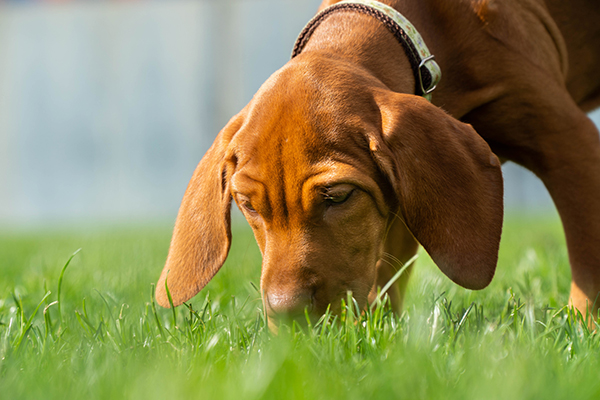
Additionally this habit can result in intestinal parasites like hookworms that can easily be picked up from animal feces. The first study involved 25 dogs and none indicated symptoms of illness before eating grass.

The first study involved 25 dogs and none indicated symptoms of illness before eating grass.
Why do dogs eat grass and vomit. 4 Reasons Why Your Dog Eats Grass 1. Dogs Find Grass Tasty. Even before dogs were domesticated they had been scavenging omnivores animals that eat both.
Dogs Could Be Bored. Every day a dog focuses on his pet parents activities seeing them leave their home and. Dogs are habitually carnivores but they do eat plants and vegetables.
Dogs perhaps end up eating grass when he travels outside. Similar to all living creatures dogs also need a nutritional value such as fats carbohydrates proteins vitamins minerals fiber and water in a well-balanced diet to fulfill their daily needs. The consumption of grass can be a sign that your dog is attempting to relieve an upset stomach and some pups do vomit soon after eating it.
The survey was aimed at proving whether dogs eat grass because they are ill or that it induces vomiting in dogs. The study also focused on proving whether the habit is related to any dietary deficiency. The first study involved 25 dogs and none indicated symptoms of illness before eating grass.
Other suggested reasons why your dog might be eating grass include improving digestion treating intestinal worms or fulfilling some unmet nutritional need including the need for fiber. A dog vomiting clear liquid usually indicates the beginning of the vomiting process. Moreover this type of vomit occurs when.
He has eaten foreign material. He has eaten grass. He has motion sickness.
He was too energetic right after a meal. If the vomit persists with chunks of food and visible stomach bile then you will be able to identify the cause. Eating grass and vomiting is the cause in the stomach.
It is a common belief that grazing dogs do this because of stomach problems. Some four-legged friends eat grass and break shortly afterwards. While cats are known to eat grass to throw up hairballs at least that can be ruled out as a reason for dogs.
But why does a dog eat grass and vomit. Although some dogs do vomit it doesnt always happen and this research suggests that its actually more common for dogs not to be sick after eating grass. They need fibre Some researchers have suggested that some dogs may eat grass to try and get more fibre into their diet.
In respect to this why do dogs eat grass and then throw up. And grass-eating doesnt usually lead to throwing up– less than 25 of dogs that eat grass vomit regularly after grazing. Other suggested reasons why your dog might be eating grass include improving digestion treating intestinal worms or fulfilling some unmet nutritional need including the need for fiber.
Dogs do also eat grass and this is not just because of possible nutrition. Dogs also purge hairballs and other stuff that upsets or doesnt belong in their system through purgingpuking. Now I am not a dog expert but from what I understand dogs also groom themselves and hence they will also ingest a good amount of fur.
So its very unlikely that most dogs eat grass because they are sick. It could be that dogs vomit because they ate grass rather than the other way around although there is no scientific evidence to support either side. Additionally this habit can result in intestinal parasites like hookworms that can easily be picked up from animal feces.
It is true that in some cases a dog may be eating grass to induce vomiting. This could be because they ate something bad already which is causing nausea or other stomach discomforts. They often dont eat the grass However a dog who is eating grass to make themselves throw up probably wont actually eat the grass.
Dogs also eat grass to help ease the discomfort in their stomachs. If a dog vomits afterward its more than likely that the reason isnt the grass itself but the upset stomach. Simply put eating grass is as much a symptom as vomiting itself is.
Of course if your dog does this only a few times then its probably not a cause for concern.